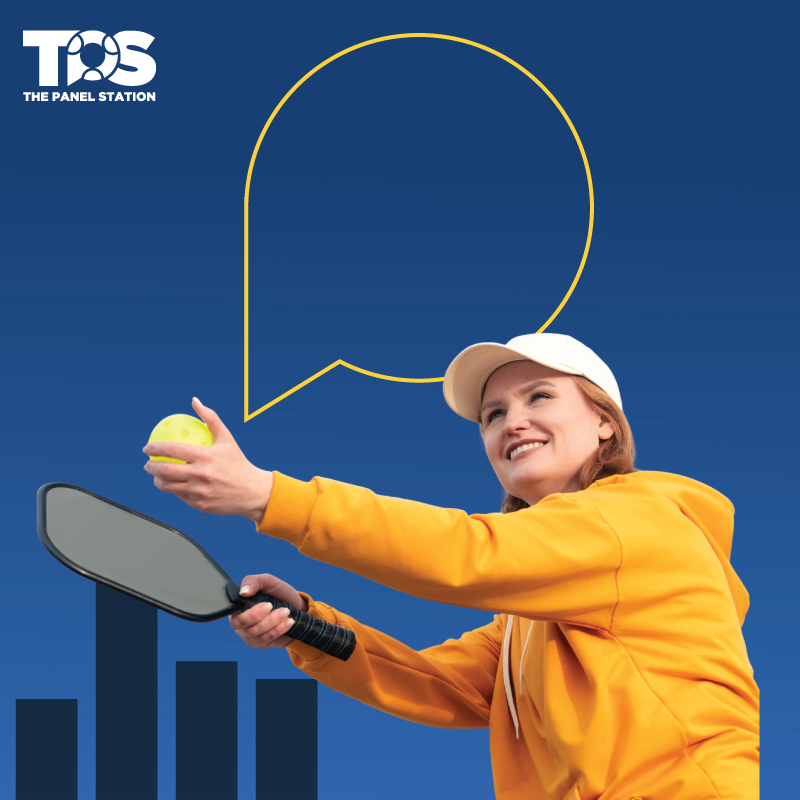

Pickleball - The OG Sport in Australia Today
What pickleball quietly reveals about low-pressure fitness, social leisure, and how new habits spread
Pickleball did not enter Australia like a traditional sport does.
It arrived the way modern trends often arrive: a clip you scroll past twice, a friend who says “come try it,” a community court you did not notice last month, and then one day you are holding a paddle wondering why this feels easier than you expected.
This study was not really about a racket sport. It was about what Australians do when they are tired of intensity, but still want movement, and still want people.
We explored first impressions of pickleball, willingness to try it, what motivates participation, how 165,332 Australians compare it to other racket sports, whether they see it as a “real sport,” how intense they believe it is, and whether they think it can ever rival tennis.
Now, it’s your turn!
1. Pickleball wins before it starts, because it feels like a smile
The first reaction to pickleball is rarely about performance. It is about vibe.
A combined 64.2% describe it as either a “fun social sport” (32.6%) or react to the quirky name (31.6%). Only 12.6% dismiss it as “not a real sport.”
That is a telling entry point. Pickleball earns attention by sounding approachable, even a little silly. It invites curiosity before it invites commitment.
No Data Found
No Data Found
Here’s a question for you!
2. Most Australians are still watching from the sidelines, but the door is not closed
Right now, participation is low, but curiosity is not.
About 65.3% say they are not interested, yet a meaningful 27.4% say they have not played but want to. Actual experience is still small: 6.3% have tried it once or twice and only 1% play regularly.
What matters is the shape of the pipeline. Pickleball is in the “watch first, try later” phase. That is exactly how social activities spread when they rely on timing, access, and an invitation.
No Data Found
No Data Found
Quick question!
3. The strongest pull is ease, not fitness
When people explain why they want to try pickleball, the top reason is simple: it looks easy and fun.
About 37.9% are drawn in by that ease, 27.4% by the fact it is trending, and 23.1% because friends or family influence them. Fitness goals come last at 11.6%.
This is the clearest signal so far: pickleball is being adopted as a social leisure habit first, and a workout second. It is movement that does not demand a “fitness identity” to begin.
No Data Found
No Data Found
Why it matters:
If fitness only “counts” when it feels intense, we may be ignoring the kind that actually sticks.
What’s your take?
4. It is being compared to tennis, but it is not competing on the same scoreboard
When Australians compare pickleball to other racket sports, the dominant perception is not “better,” it is “lighter.”
About 31.6% call it less intense and another 31.6% call it more social. A further 10.5% say it is easier to learn, while 26.3% find it not as exciting.
That split explains the emotional position pickleball is taking. It is not chasing prestige. It is occupying the space where many adults actually live: busy schedules, moderate energy, and a desire to be active without being drained.
No Data Found
No Data Found
What do you think?
5. People are unsure what to label it, and that uncertainty is part of its growth
Australians are still deciding what pickleball “is.”
Roughly 32.6% are not sure yet whether it is a sport or a hobby, and another 32.6% call it a fun fitness activity. Only 7.4% firmly label it a real sport, while 27.4% see it as a social game.
Here is the pattern worth naming, but only once: when an activity grows through belonging, it often gets taken less seriously at first. That does not stop adoption. It accelerates it.
People also see its intensity as flexible: 51.6% say it depends on how you play, and 25.2% see it as a moderate workout. That “it depends” is basically pickleball’s superpower. It can meet you where you are.
No Data Found
No Data Found
Now, it’s your turn!
6. Australians doubt it will replace tennis, and that is not a problem
When asked if pickleball will ever be as big as tennis, skepticism dominates: 42.1% say probably not, 29.5% say never, and 28.4% say maybe someday.
That skepticism is healthy. Tennis has legacy, structure, and status. Pickleball is building something different: ease of entry, social warmth, and low friction.
This is also reflected in how seriously people think Australians take it: 42.1% call it casual fun, 25.3% say hardly serious, and only 12.6% see a growing serious community.
So the story is not “the next tennis.” The story is “the sport that suits the moment we are in.”
No Data Found
No Data Found
Here’s a question for you!
Pickleball in Australia looks like a trend on the surface, but the opinions reveal something more durable underneath: a growing preference for activities that are social, low-pressure, and easy to start.
Right now, most are still watching. But a solid curiosity segment is forming, and the strongest fuel is not competition. It is approachability.
If courts and access catch up, participation will likely rise without needing hype.
Quick question!
Disclaimer:
These insights are not just for brands; they are for anyone trying to understand how decisions are made in 2025-26. The more people share, the clearer the picture becomes.
FAQ's
1. Why is pickleball getting popular in Australia?
Because it feels approachable. First impressions skew playful and social, with 32.6% calling it a fun social sport and 31.6% reacting to the quirky name, which lowers intimidation before anyone even plays.
2. How many Australians have actually tried pickleball in this study?
Only 6.3% have tried it once or twice and 1% play regularly, but 27.4% say they want to try it, showing interest is ahead of participation.
3. What motivates Australians to try pickleball?
The biggest driver is that it looks easy and fun (37.9%). Trendiness (27.4%) and friends or family influence (23.1%) also matter more than fitness goals (11.6%).
4. Do Australians see pickleball as a serious sport?
Many do not label it that way yet. Only 7.4% call it definitely a real sport, while 32.6% are unsure and 27.4% call it a social game.
5. Is pickleball considered intense exercise?
Most think intensity is flexible. 51.6% say it depends on how you play, and 25.2% see it as a moderate workout.
6. Will pickleball ever be as big as tennis in Australia?
Most doubt it: 42.1% say probably not and 29.5% say never, though 28.4% believe it might happen someday. The more important story is that pickleball does not need to replace tennis to grow.
About Author : Soneeta
A bookworm at heart, traveler by soul, and a sports enthusiast by choice. When she is not exploring new places, you’ll find her curled up with her pets, binge-watching movies. Writing is her forever sidekick. Soneeta believes that stories are the best souvenirs you can collect. Basically, she is fueled by books, adventures, and a whole lot of pet cuddles.
